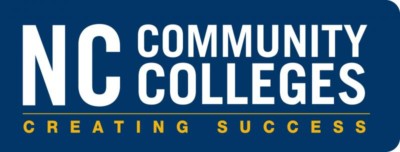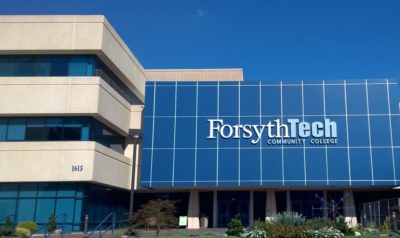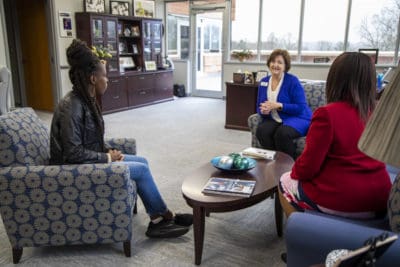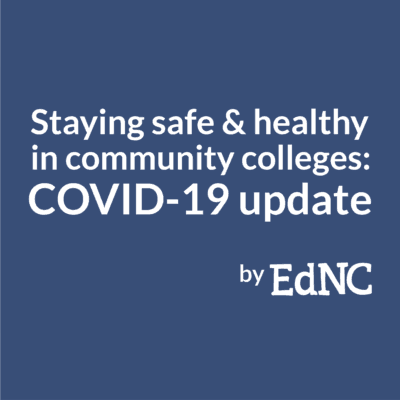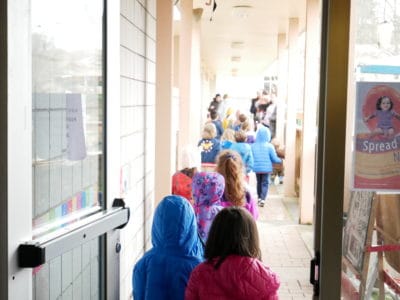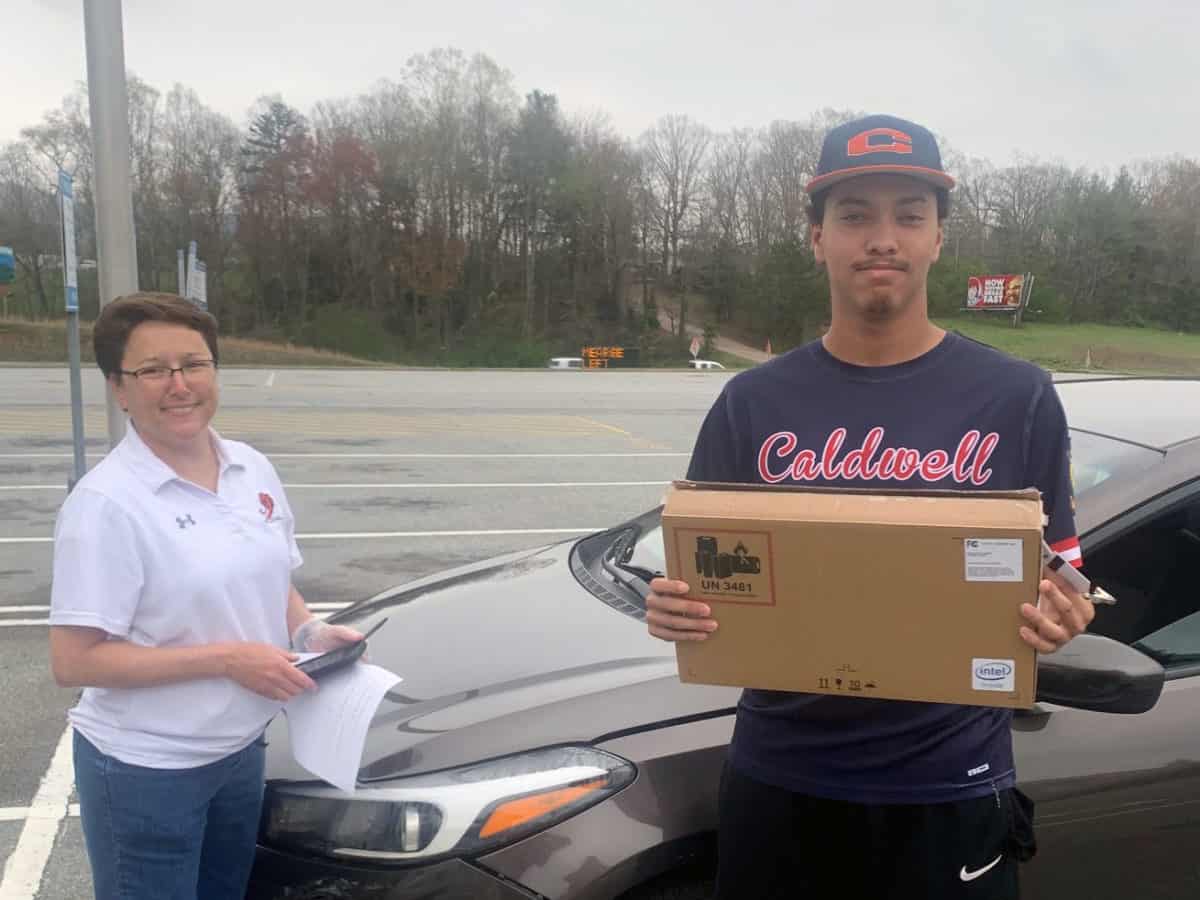
As community colleges switch most of their instruction to remote teaching during the COVID-19 crisis, students obviously need both internet access and devices to continue their education. Caldwell Community College and Technical Institute (CCC&TI) is working with Google to address both needs.
On Wednesday, March 25, CCC&TI began lending 50 of its students HP Chromebook 11 laptops donated to the school by Google, which has created more than 250 jobs at a data center it opened in Lenoir in 2009.
“I’m hopeful that they’ll be a good resource for our students,” said college president Mark Poarch, who reached out to Google when the COVID-19 crisis began to bite. “We have a second shipment coming.”
The college and Google also are working on a creative way to bring broadband access to underserved areas where Caldwell students live, Poarch said.
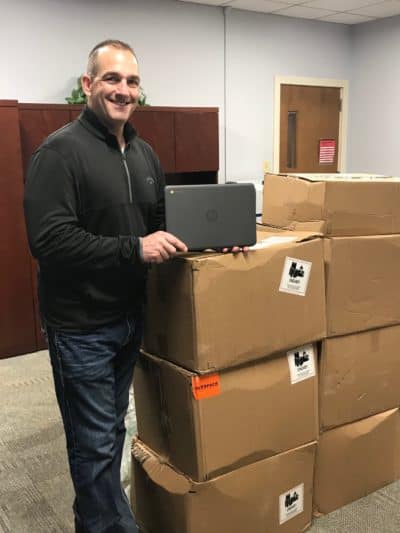
CCC&TI is surveying its students and using social media to determine their technology needs, said Edward Terry, executive director of community relations for the school. The college then follows up with respondents and selects students who can come to campus and pick up Chromebooks.
As of Thursday morning, Poarch said, 111 students in curriculum courses said in the survey that they didn’t have internet access, 78 said they didn’t have devices, and 40 said they lacked both. Those numbers, which Poarch is sharing with Google to help shape its response, don’t include students in workforce development or adult education.
The school’s spring enrollment of curriculum students is 3,481, Terry said.
CCC&TI, which has campuses in Hudson in Caldwell County and Boone in Watauga, has worked with Google on educational initiatives since the company announced in 2007 that it was coming to Lenoir, Poarch said.
As it became apparent this month that COVID-19 would shut down normal college functions, Poarch reached out to Google’s Lenoir site director, Jorge Gutierrez. “I wanted to have a discussion and see if, and how, they might be able to help,” he said.
“They took our discussion and went back and figured out on their end, here’s how we can help,” Poarch said Thursday of the Chromebook donations. “Their only concern, really, was the supply chain and the availability of Chromebooks, given the demand across the country.”
Poarch, who came to the school in January 2006 and has been president since 2016, said the college’s relationship with Google goes back to 2007, when the company announced its plan for the data center.
“We sent a team out to Mountain View (in California, where Google is based) and met with their representatives out there and designed a program called the IT Institute, designed to meet their workforce needs in Lenoir,” he said.
“It’s designed to prepare people for the IT industry in general … and they’re kind of driving the curriculum and telling us, hey, here are the things that somebody needs to know if they’re coming to work for Google. But you can use it for any IT industry.
“The industry changes so fast, and we’re trying to keep up and prepare students for the latest technology and what they’re going to see, so we’re glad to have Google at the table.”
In 2016, Google ran a pilot project called Rolling Study Halls in Caldwell County, putting Wi-Fi in school buses so students who did not have broadband access at home could do their homework while riding to and from school. The program is now in more than 16 school districts across the country.
Google is now planning to install more Wi-Fi access on additional Caldwell buses and place the buses in remote areas of the county, where students, including those at CCC&TI, can drive, park, and get access, Poarch said.
Google is still working on that initiative, he said. “Hopefully the installation will happen any day now.”
Other challenges
Of course, the social distancing wrought by COVID-19 has brought big changes to instruction at all 58 North Carolina community colleges. At CCC&TI, the main campus is closed until March 31, and the school has moved instruction online for the rest of the semester in as many classes as possible, Terry said Thursday.
“We have not set a date, since this is an ever-changing situation, for resuming face-to-face instruction,” Terry said. “Our goal is to get those programs running again as soon as possible, so long as it’s safe for our students and faculty.”
And for Poarch, equity in online access is only one of his worries.
“Our students are starting to have issues paying their bills,” he said Thursday. “Some who had part-time jobs have lost those jobs; some of their spouses have lost their jobs.”
He said the school had received an additional $20,000 from the state to use for Finish Line grants, which allow community college students who are at least halfway through their studies to apply for up to $1,000 per semester to cover financial emergencies.
“We’re deploying that money as quickly as we can to help students,” Poarch said. “And we also have an emergency fund provided through our foundation, to help students get through tough times.”
Food insecurities, the mental health of students and employees, the challenges of keeping students engaged with the campus community when they’re not there — “it’s not just academic needs, but the holistic needs that students have” that concern everyone at the school, Poarch said. But he sees hope.
“There’s so many great things happening across our system of 58, and this time has stretched us in ways that were probably unimaginable just a couple of weeks ago,” he said. “I’m seeing faculty and staff take each other under their wings.
“I think there’s a lot of good that will come out of this. One being technology, but another being just finding creative ways to help each other and help students be successful. And we’re here for our communities, too.
“We’re trying to make sure that we take care of each other.”

